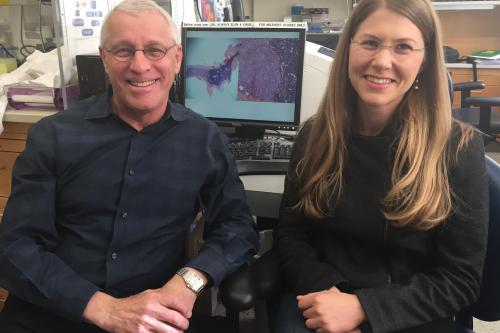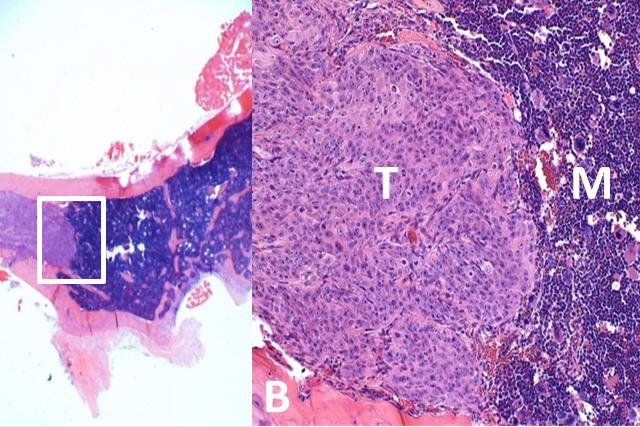
UCLA study identifies potential therapeutic targets for metastatic prostate cancer
Scientists at the UCLA Eli and Edythe Broad Center of Regenerative Medicine and Stem Cell Research have pinpointed five specific enzymes called protein kinases that play a role when prostate cancer spreads to bone. The discovery could point the way toward new drugs that slow or stop prostate cancer from spreading.
The findings, which were published in the journal Proceedings of the National Academy of Sciences, are particularly important because in the vast majority of men whose prostate cancer spreads, or metastasizes, the cancer reaches the bone and is much more difficult to treat. When the disease is confined to the prostate, it is often treatable and sometimes curable.
“Once the cancer spreads outside the prostate and becomes less dependent on male hormones like testosterone, few treatment options remain,” said Dr. Owen Witte, founding director of the UCLA Broad Stem Cell Research Center and the study’s lead author. Witte is a Howard Hughes Medical Institute investigator and a member of the President’s Cancer Panel, which reports to President Barack Obama.
There are more than 500 protein kinases in human DNA. Protein kinases are important because they activate essential cell functions, such as growth and survival, and are known to play a role in many cancers. Protein kinases have been successfully targeted with drugs called kinase inhibitors in cancers like chronic myelogenous leukemia, which begins in the bone marrow. Since kinase activity varies in different types of cancer, identifying the specific cancer-causing kinase is a critical first step in the drug development process.
Working with scientists from the University of Washington, the UCLA researchers focused their investigation on 125 kinases that they had identified in metastatic prostate cancer tissue samples, and then narrowed the study to the five that appeared to be most prominent in prostate cancer tissue when it spreads to bone. They found that the same five kinases were absent, or virtually absent, in non-cancerous tumors and early-stage prostate cancer tissue.
“Our findings show that non-mutated protein kinases can drive prostate cancer bone metastasis,” said Claire Faltermeier, the study’s first author and a medical and doctoral student in Witte’s lab. “Now, we can investigate if therapeutic targeting of these kinases can block or inhibit the growth of prostate cancer bone metastasis.”

Witte’s research has long sought to explain how disease develops on a cellular level. His discovery that a specific type of kinase activity, called tyrosine kinase, can play a role in certain types of leukemia became the foundation for the creation of Gleevec, the first targeted therapy for chronic myelogenous leukemia.
“Cancer-causing kinase activity has been successfully targeted and inhibited before. As a result, chronic myelogenous leukemia is no longer fatal for many people,” said Witte, who also is a member of the UCLA Jonsson Comprehensive Cancer Center and a professor of microbiology, immunology and molecular genetics at the UCLA David Geffen School of Medicine. “I believe we can accomplish this same result with advanced stages of prostate cancer with a fundamental understanding of the cellular nature of the disease.”
Metastatic prostate cancer causes 30,000 deaths in the U.S. each year, making it the second-leading cause of cancer death in American men.
The research was supported by the Pacific Northwest Prostate Cancer Specialized Program of Research Excellence, the National Institutes of Health, the California Institute for Regenerative Medicine training grant program, a U.S. Department of Health and Human Services Ruth L. Kirschstein Institutional National Research Service Award, the Department of Defense Prostate Cancer Research Program, an Honorable A. David Mazzone Special Challenge Award from the Prostate Cancer Foundation, the Jonsson Cancer Center and the Broad Stem Cell Research Center.
The research also was supported by a Prostate Cancer Foundation challenge award and a Stand Up To Cancer–Prostate Cancer Foundation Prostate Dream Team Translational Research Grant, the latter of which is made possible by the generous support of the Movember Foundation. Stand Up to Cancer is a program of the Entertainment Industry Foundation administered by the American Association for Cancer Research.
